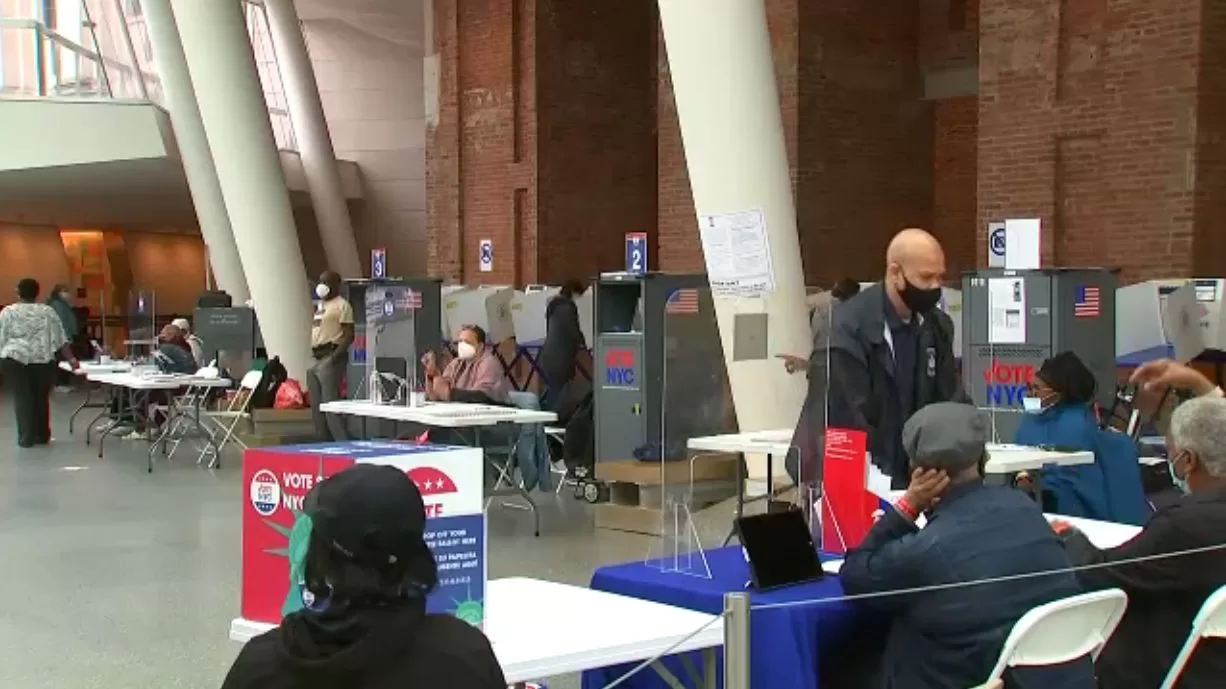Black Knight is a beautiful example of the role and importance of science fiction within pop culture. More than bringing futuristic worlds and playing with tomorrow’s technologies, the genre serves to discuss the now. And that’s what the new Netflix series does very well — and even in a not-so-subtle way — by creating an entire analogy to reflect on the pandemic and its impact on social, governmental and market issues. The problem, however, is how and to what end she does this analysis.
The comparison between the series and our still recent reality is more than obvious. The story centers on a South Korea that has turned into a huge desert after a climate cataclysm that wiped out 99% of the population. With that, what’s left of humanity lives in settlements divided into castes and depending on couriers to survive, guaranteeing everything from oxygen to food.
And the idea of conducting this narrative through these couriers, treating them as the heroes of this post-apocalyptic world in the best style Mad Max it’s really a very good premise, even more so when it mirrors our world and we remember when we were dependent on the category. But the production stumbles both in execution and in the message, so that analogy and discussion lose the expected power.
What story do you want to tell?
Let’s start with the shape. Black Knight does a great job of building this post-apocalyptic world, creating a tension-filled reality where everything makes sense. Although these elements are presented all at once, which makes things very confusing at first, it is easy to recognize the parts and allegories that the series proposes.
The main conflict of the plot is in such a caste system, which divides society into distinct classes — refugees, general, special and central —, with each one living in specific districts of Seoul. That’s because the government is planning a more comprehensive type of social reorganization than what Cheonmyeong, the megacorporation responsible for supplying society and producing oxygen, proposes.
That’s where the hero figure 5-8 (Kim Woo-bin) comes into play. He is part of this group of couriers and is considered a legend among the population, although the series never bothers to explain the reason for this admiration. And although he is an employee of this great company, he tries at all costs to prevent it from dictating the rules for how Korea should get back on its feet.
As said, it is a very interesting premise for several reasons, but with some stumbles that take away its power. And, in the case of the narrative itself, we begin to see these slips from the moment the series decides that it is better to tell another story that is not exactly the one presented in its first episode.
A good part of the six chapters of this first season are dedicated to the journey of another hero that is far less interesting than 5-8 and the rest of the courier militia. Especially because the saga of Sa-Wol (Kang You-Seok) is much more of a detour than something we really want to follow.
The initial motivations even make sense. For a refugee like him, becoming a delivery man is an opportunity to move up in life and have a minimum of dignity in this highly stratified society. The problem is that this is not deepened at any time and the series decides to unite some ideas and clichés that not only do not make sense for the story being told but also disturb that core that was so promising at the beginning.
Suddenly, a whole plot about mutants comes in that leads nowhere and there is even room to start a tournament to see who will become the new delivery boy, with Sa-Wol being the big dark horse of the competition. It’s a silly anime cliché that’s left too much around here.
And before anyone says that this is in the webcomics that inspired the Netflix series, it’s always good to remember that adaptations serve precisely to adapt and make these stories fit within the proposed format — which is not the case here. By following this path, Black Knight he turns his back on what was strongest in him to follow an uninspired and very tiring path.
The result of this is that the criticism and reflection that this analogy to the world that emerged during and because of the pandemic dissolves amidst this bunch of meaningless plot. And not only because they are quite questionable in creative terms, but because they don’t add anything to the plot itself. The whole plot about mutants, the disease of Cheonmyeong’s heir and even some plot twists are so empty that it’s clear that the series is winding the public to surrender for six episodes.
Following the allegory of the courier, it is as if Black Knight take the longest and most complex route to reach your destination. He goes through paths that don’t make sense and don’t add up to be able to talk about topics such as the influence of companies among the government and social hygiene.
These are very good and pertinent discussions in this post-pandemic moment and it was the perfect opportunity for the series to use science fiction to raise the debate. Only, by focusing on the wrong things, all of this is thrown into the background to prioritize the classic tournament that everyone knows how it ends. And, as much as the script still tries to fit the criticism in this silliest part, it is done without any power.
Of course, there are good action sequences in the meantime, as during the entire episode dedicated to the delivery simulation. However, the price paid for these moments seems too high.
biased discussions
Se, na forma, Black Knight stumbles by giving too much attention to characters and plots that are not so relevant, the content of the series also brings a mix of successes and mistakes that it is impossible not to talk about.
As said, the idea of discussing the effects of the pandemic on society is a huge success for the series. Showing this dystopian future that has such strong connections with our reality is quite impressive. Not just because the society that depends on masks to survive is still very recent in our memory, but because of all the situations that surround it all.
The caste system of the series very well reflects the impact of the pandemic on different social strata not only in Korea, but around the world. And the series does a good job of showing how refugees are treated as disposable lives by the elite. While the poorest live on crumbs counting the seconds of oxygen available on a daily basis, residents of the Central District live under a dome that simulates normal life before the end of the world — and they don’t even have to worry about masks or shortness of breath. .
Plus, there’s all the debate about the influence of the megacorporation that provides oxygen, food, and transportation to keep this entire world alive. Cheonmyeong being the great villain of history is not a surprise, but it is interesting to see how the series proposes to show how society can become hostage to large companies when it starts to depend on them for everything, reaching the point of dictating political directions. and society in the country.
This is where things start to get a little more complicated. As Black Knight devotes a good part of his time to following a plot that leads nowhere, all the social criticism present in the 5-8 fight against the system ends up being reduced to a few somewhat questionable looks and developed in a hurry.
Not that the debate about the role of these large companies — especially pharmaceuticals — does not deserve to be questioned, but the option of turning the villain Ryu Seok (Song Seung-heon) into a caricature businessman who wants power at all costs deflates and skews the discussion into a dangerous path.
By placing pharmaceuticals as this evil company that literally carries out a coup d’état, pollutes the air to sell more oxygen and exterminates the poorest through vaccines, Black Knight adopts a very dangerous discourse within the context that the series itself proposes.
From the moment the series decides to use science fiction to talk about the pandemic and its social impacts, it brings a somewhat dangerous anti-vaccine discourse that is not considered at any time and that becomes pamphleteering at an uncomfortable level.
power loss
Black Knight He had incredible potential in his hands. Although many productions have spoken about the pandemic in recent years, the South Korean series is one of the few that dared to use science fiction to make a deeper discussion on topics that are really relevant. However, she seems to have gotten carried away with it and said too much within just six episodes.
The result is that he wastes precious time that could be used to delve into characters — like 5-8 himself, whose past is just a brushstroke without major developments — and give the proposed discussion the seriousness that suits it. But that’s not what happens.
By preferring to be half-anime, with the “tournament saga” and all, it empties many of the good ideas it presents and fails to take debates to the level they require. And, as much as it brings good action scenes and a very interesting aesthetic, Black Knight becomes just an average delivery.
Black Knight can be watched by Netflix subscribers.





